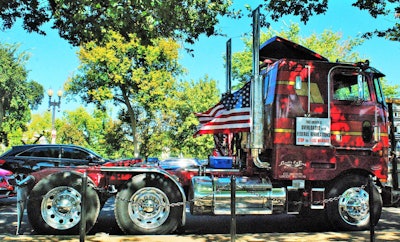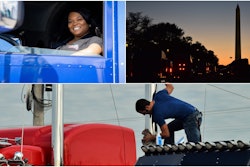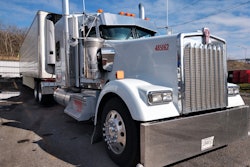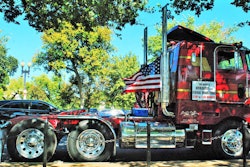Among perhaps the biggest ripple effects from the ELD mandate protests could be, some truckers believe, a new appreciation for the cultural diversity within the owner-operator community. That’s something that both Scott Reed, part organizer among the different groups that came together in D.C., and owner-operator Mike Landis, who participated, certainly agree on. In this Overdrive Radio podcast, you’ll hear Reed’s reflection on outcomes and next steps, and Landis offers his narration of what it was like to have been a part of the protest effort, with his 1999 Peterbilt cabover here pictured along for the ride.
Part of both of their reasoning was new affinity felt with the large number of owner-operators from the Indian-American Sikh community that participated in the D.C. protests and were fairly well-organized in California and other Western states as well.
 Owner-operator Mike Landis’ cabover
Owner-operator Mike Landis’ caboverA member of that community, small fleet and truck stop owner Mintu Pandher, based in Wyoming and with whom I spoke following his participation in the meeting with FMCSA that took place in D.C. Thursday, Oct. 5, during the protest efforts, was hopeful the FMCSA saw that clearly, too, and ultimately takes his and others’ concerns with the ELD mandate to heart.

“We cover six states around us,” he says about his small fleet, with around 10 trucks hauling fuel and delivering on a government contract to some sensitive locations. Some are so sensitive that in some cases with some companies the “dispatchers don’t event know where the location is” — missile silos, he added, and the like.
Pandher’s blue 2016 Peterbilt 389 was parked on Constitution Ave. with Mike Landis’ truck and others’ during Day Two of the protest, and he was among the group who met in Leesport, Pa., prior to the D.C. events at the Big Rig Rendezvous truck show to in part establish the United Motor Carriers Council advocacy group for independents.
As he put perhaps his chief concern to reps from the DOT/FMCSA, “If we are getting monitored going point A to point B to sensitive spots in the U.S., if something happens, is there a study you’ve done – have you talked to the Department of Defense and the Air Force – will this jeopardize the integrity” of security operations, having a third-party monitoring device installed within a truck. Did the military say “they are OK” with it? “I don’t want to lose my contract” — in place since 1999, he said – “suddenly because of that kind of issue.”
On this business/security concern and other issues, the DOT urged meeting participants to continue to engage as FMCSA looked into it.
“I truly thought there would be some concrete answers, and there were none,” Pandher said. Some meeting participants more or less threw up their hands. “That’s the FBI and security agencies’ problem, not ours,” he paraphrased. To him and others, security remains a big issue. “Why in the world does FMCSA want a third-party device tracking a truck that goes to missile silos?”
When Pandher and I talked, two weeks back, he and others continued to wait for answers.









